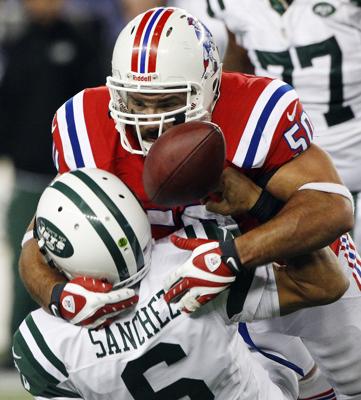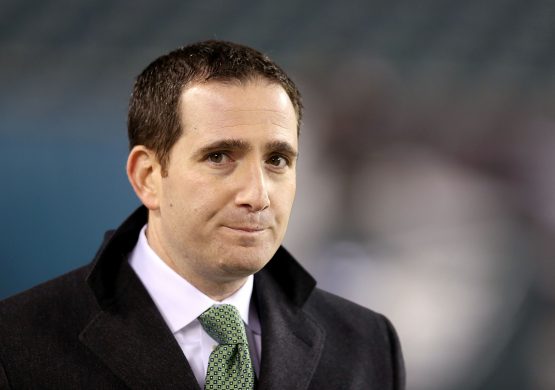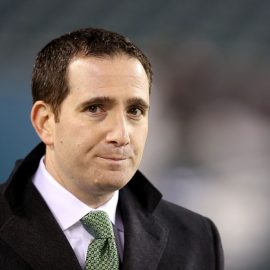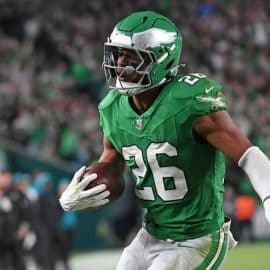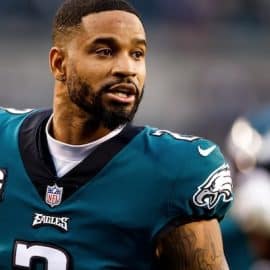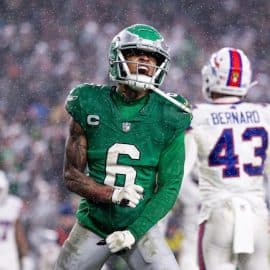The NFL tournament is down to the Final Four—- San Francisco and Seattle in the NFC, and Denver and New England in the AFC— which is the EYE's cue to officially begin looking at the 2014 season for the Eagles.
Jay Gruden is the new head coach in Washington, DC. The Dallas Cowboys have decided to retain offensive coordinator Bill Callahan. No big changes in the New York Giants organization…. It's up to the Eagles to prove 2013 was no fluke and to defend their NFC East division title…
First order of business—- salary cap decisions.
A lot of fans seem to think this is the year you should release Trent Cole—and give up on Brandon Graham.
I disagree completely.
Here are the salary cap implications…
The Eagles are in a great situation cap-wise. They are projected to have about $22 million in cap space. That is plenty of money to play with this offseason, but the Eagles could have more if they decide to let some players go who might not be worth their salary next season.
Now the popular thinking is these are the guys who should be released to free up even more cap space:
1. James Casey ($3.5 million): Casey will be an interesting decision for the Eagles. Although he didn't play much, he is a strong special teams players and a very solid backup. Casey got more snaps as the season progressed, and he is a great locker-room guy. Although he makes more money, it's easy to see the Eagles electing to keep Brent Celek over Casey, considering how much more Celek played this season. The Eagles could decide that Casey isn't worth the money, however, if they draft a young tight end.
2. Patrick Chung ($3.2 million): Chung might be in danger of being released even if he didn't make over $3 million, but the fact that he does only increases the chances he could be one-and-done in Philadelphia. Defensive coordinator Bill Davis admitted that Chung had some rough patches, and the veteran safety lost his job at one point to rookie Earl Wolff. With the Eagles likely to pick a safety early in the NFL Draft, Chung is a goner.
3. Trent Cole ($6.6 million): Trent Cole made the best he could of a bad situation this season, performing admirably in an outside linebacker position he really isn't meant to play. The chances of Cole going into next season as a stater might have to be considered slim. The Eagles need a more athletic player at his position, and Cole, 31, isn't getting any younger or faster. Assuming the Eagles find a replacement for Cole, it's hard to imagine they decide paying him $6.6 million to a be a backup is a good investment.
4. Jason Avant ($3.96 million): Avant never finds his names in the headlines, but that doesn't change the fact he has had a very underrated career with the Eagles. Avant is a strong blocker, has maybe the best hands on the team, and is never injured. He is a reliable player and a leader on the team — but his time in Philadelphia might be up. The Eagles have tough decisions to make on Riley Cooper and Jeremy Maclin, both of whom are free agents. It's hard to see the Eagles paying potentially both Cooper and Maclin, then shelling out $3.96 million to Avant to be a backup slot receiver. Don't count out the possibility of Avant taking a pay cut to stay, but if he doesn't, this could have been his last season with the Eagles.
5. Brandon Graham ($3.3 million): Graham is in an interesting spot, as he is younger than Cole and one of the better pure pass rushers on the team. But despite his best efforts, it's unlikely the Eagles view him as a long term solution at outside linebacker. Graham played sparingly this season, and that probably won't change next year if he is here. A price tag of $3.3 million might be too much for the Eagles to justify keeping Graham around.
BUT….. I think you should keep Trent Cole and Brandon Graham…and maybe even Casey and Avant… and here's why…
Casey is a growing part of the run game and figures to be brought in more often by Kelly – and should not be leaving. Chung is a performance cut, not a cap casualty. Trent Cole had a great second half. He may be asked to restructure his deal, but he is not getting forced out. Kelly won't work that way with respected players. Graham won't be cut, but he might be traded to a better situation for him. Avant works the locker room for Kelly too well to be a money cut. Again, a deal restructure or just being outperformed by a younger player is possible, but not a cap casualty.
Another reason Graham will not be cut —and that's not going to happen. Here is why: if he is cut, it doesn't save the Eagles a single dime, nor does it change his cap impact.
Most of the money in his 2014 cap figure was paid to him in an up-front bonus pro-rated over the life of the contract. The Eagles will have to pay him half (just under $1.7mil) the $3.3 million he would earn this year for his services.
Also, you can't cut two of your three OLBs, especially when they already know the system.
You don't simply cut a guy if it saves the team zero dollars, especially when half the money owed has already been paid – it's a sunken cost. Given such, the only way Graham is cut is if he is deemed to be the 5th best OLB on the roster, and is simply cut because he isn't good enough. Something tells me that won't happen.
Now is also the right time to start thinking about the Eagles' 2014 Draft….
Phil Sheridan, who now writes for ESPN.com, gave us a quote on why picking at #22 in the NFL Draft is not necessarily a bad thing for the 2014 Eagles:
"If a team drafted 22d every year and did well, it could be awfully good. Based on the last 10 years, drafting only players taken between No. 22 and No. 32 (the end of the first round), a team could have Aaron Rodgers at quarterback, wide receivers Dez Bryant and Santonio Holmes, running backs Steven Jackson and Chris Johnson, linebackers Clay Matthews and Nick Perry, safety Brandon Meriweather and defensive linemen Cameron Jordan and Sharrif Floyd. "
"You could do worse. Plenty of teams did do worse. Cleveland took two quarterbacks, Brady Quinn and Brandon Weeden, at No. 22. "
Later we’ll look at some possible players the Eagles could consider at No. 22 in this year’s draft. For now, here’s a quick look at the 22nd pick in each of the past 10 NFL drafts, along with a few players that were on the board at the time (I didn’t go beyond the end of the first round out of fairness; just looking at first-round graded players):
2013: Cornerback Desmond Trufant from Washington, selected by Atlanta.
On the board: Defensive tackle Sharrif Floyd, WR/Returner Cordarrelle Patterson, defensive end Datone Jones.
2012: Quarterback Brandon Weeden from Oklahoma State, selected by Cleveland.
On the board: Linebackers Dont'a Hightower and Nick Perry, running back Doug Martin.
2011: Offensive tackle Anthony Castonzo from Boston College, selected by Indianapolis.
On the board: Offensive lineman Danny Watkins, defensive end Cameron Jordan, running back Mark Ingram.
2010: Wide receiver Demaryius Thomas from Georgia Tech, selected by Denver.
On the board: Wide receiver Dez Bryant, quarterback Tim Tebow, cornerback Devin McCourty.
2009: Wide receiver Percy Harvin from Florida, selected by Minnesota.
On the board: Offensive tackle Michael Oher, cornerback Vontae Davis, linebacker Clay Matthews.
2008: RB Felix Jones from Arkansas, selected by Dallas.
On the board: Running backs Rashard Mendenhall and Chris Johnson, cornerback Mike Jenkins.
2007: Quarterback Brady Quinn from Notre Dame, selected by Cleveland.
On the board: Wide receiver Dwayne Bowe, safety Brandon Meriweather, linebackers Jon Beason and Anthony Spencer, offensive tackle Joe Staley.
2006: Linebacker Manny Lawson from N.C. State, selected by San Francisco.
On the board: Offensive lineman Davin Joseph, wide receiver Santonio Holmes, running back DeAngelo Williams, defensive end Mathias Kiwanuka.
2005: Wide receiver Mark Clayton from Oklahoma, selected by Baltimore.
On the board: Cornerback Fabian Washington, quarterback Aaron Rodgers, wide receiver Roddy White.
2004: Quarterback J.P. Losman from Tulane, selected by Buffalo.
On the board: Defensive tackle Marcus Tubbs, running back Steven Jackson, defensive end Jason Babin.
By the way, Sheridan has an interesting review of the Eagles' 2013 Draft Class…. it goes like this—-
First round: Lane Johnson, offensive tackle, Oklahoma. The fourth overall pick, Johnson was one of the three offensive tackles taken at the top of the draft. He arguably had a better overall rookie season than No. 1 pick Eric Fisher (Kansas City) and No. 2 pick Luke Joeckel (Jacksonville).
Perhaps inevitably for a guy who had played quarterback and defensive end before being shifted to the offensive line in college, Johnson had some growing pains. According to Pro Football Focus, he allowed seven sacks in the first eight games of the season but just three the rest of the way. He was solid in run blocking, as well.
It’s worth noting, too, that few rookie tackles (if any) are asked to line up split wide and block on bubble screens. Johnson took everything thrown his way with a smile and a shrug. He’s got a chance to be anchored at tackle for this franchise for a decade.
Good pick or bad pick? Very good pick.
Second round: Zach Ertz, tight end, Stanford. Taking Ertz here, 35th overall, was an expression of GM Howie Roseman’s commitment to taking the top-graded player regardless of need. The Eagles already had signed James Casey in free agency and had Brent Celek on the roster.
Would they have improved their overall team more by drafting cornerbacks Darius Slay or Johnthan Banks, or linebackers Manti Te’o or Kiko Alonso, or running back Giovani Bernard?
Maybe. But Ertz is going to be making plays in Kelly’s offense for years to come. He’s smart, driven and possesses excellent hands and good size (6-foot-5, 250). Like most young tight ends, he has to improve as a blocker and said he plans to spend time in the weight room in the offseason.
Good pick or bad pick? Good pick.
Third round: Bennie Logan, defensive tackle, LSU. The 6-foot-2, 309-pound Logan’s development allowed the Eagles to trade veteran Isaac Sopoaga at the deadline. Logan started at nose tackle the last eight games, which corresponded with the overall defense’s improvement.
Oddly, Logan had his only two sacks in the first half of the season, when he was playing limited snaps. It remains to be seen if he’s the true anchor/nose tackle of the future, but he has enough versatility to play in different fronts as needed.
Good pick or bad pick? Good. Best possible? A few of the guys taken right after Logan look pretty good, too.
Fourth round: Matt Barkley, quarterback, USC. The Eagles traded up to take Barkley at the top of the fourth round. It seemed an odd move at the time — everyone thought Kelly would prefer more mobile quarterbacks — and is still easily debatable.
It wouldn’t be fair to read too much into Barkley’s limited playing time. He was pressed into service when Nick Foles and then Michael Vick were injured. Barkley had little practice time to draw upon. He threw four interceptions and zero touchdowns in 49 attempts.
If he’s the No. 2 quarterback here or eventually flipped to another team looking for a potential starter, he was worth the 98th pick in the draft. If he winds up starting here some day, he was a steal.
Good pick or bad pick? Curious pick.
Fifth round: Earl Wolff, safety, NC State. By this point in the draft, there’s an element of luck involved. The Eagles desperately needed safety help and took a shot on Wolff with the 136th pick. It was a good shot.
Wolff took the starting job from veteran Patrick Chung early in the season. He had his growing pains, but was starting to settle into the job when he hurt his knee Nov. 10 in Green Bay. Wolff made one brief appearance after that, aggravated the knee and didn’t play again.
Also on board: Jesse Williams, Tharold Simon, Montori Hughes, Stepfan Taylor and Oday Aboushi were the next five players taken.
Good pick or bad pick? Good pick.
Seventh round: Joe Kruger, defensive end , Utah. He spent the season on injured reserve. Should be an interesting guy to watch in training camp.
Seventh round: Jordan Poyer, cornerback, Oregon State. Poyer made the team coming out of camp, but was released when the Eagles needed to clear roster space for a running back in October. Cleveland claimed Poyer off waivers and he finished the season with the Browns.
Seventh round: David King, defensive end, Oklahoma. Released in camp.
If the Comments button does not show up at the bottom here, just double-click on the title of the piece at the top…
Add The Sports Daily to your Google News Feed!
